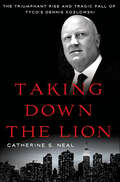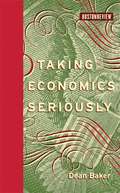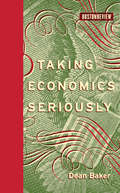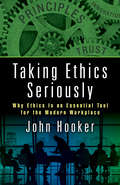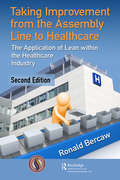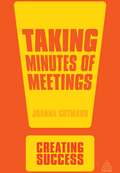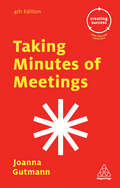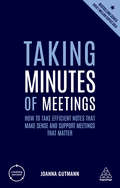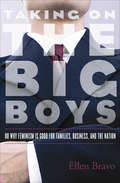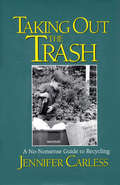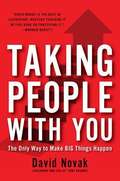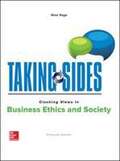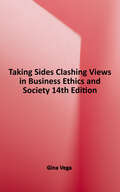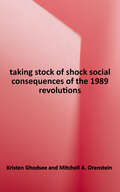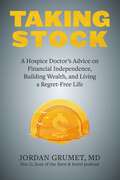- Table View
- List View
Taking Down Goliath
by Kevin M. Ryan Rob Spider" GrahamAdvances in software, auction-based media, analytics, and big data have made it possible for the average marketer to compete with marketers with 100 times the spending power. Taking Down Goliath profiles the ways in which digital marketing can level the playing field, if you know how to use it.
Taking Down the Lion: The Triumphant Rise and Tragic Fall of Tyco's Dennis Kozlowski
by Catherine S. NealTaking Down the Lion offers an inside look at the career of Tyco's most infamous CEO, and what exactly brought him down so publicly.As the widely-admired CEO of Tyco International, Dennis Kozlowski grew a little-known New Hampshire conglomerate into a global giant. In a stunning series of events, Kozlowski suddenly lost his job along with his favored public status when he was indicted by legendary Manhattan DA Robert Morgenthau—it was an inglorious end to an otherwise brilliant career. Kozlowski was the face of corporate excess in the turbulent post-Enron environment; he was pictured under headlines that read "Oink Oink," and publicly castigated for his extravagant lifestyle. "Deal-a-Day Dennis" was transformed into the "poster child for corporate greed." Kozlowski was ultimately convicted of grand larceny and other crimes that, in sum, found the former CEO guilty of wrongfully taking $100 million from Tyco.Taking Down the Lion shines a bright light on former CEO Dennis Kozlowski and the Tyco corporate scandal—it is the definitive telling of a largely misunderstood episode in U.S. business history. In an unfiltered view of corporate America, Catherine S. Neal pulls back the curtain to reveal a world of big business, ambition, money, and an epidemic of questionable ethics that infected not only business dealings but extended to attorneys, journalists, politicians, and the criminal justice system. When the ugly truth is told, it's clear the "good guys" were not all good and the "bad guys" not all bad. And there were absolutely no heroes.
Taking Economics Seriously
by Dean BakerThere is nothing wrong with economics, Dean Baker contends, but economists routinely ignore their own principles when it comes to economic policy. What would policy look like if we took basic principles of mainstream economics seriously and applied them consistently? In the debate over regulation, for example, Baker--one of the few economists who predicted the meltdown of fall 2008--points out that ideological blinders have obscured the fact there is no "free market" to protect. Modern markets are highly regulated, although intrusive regulations such as copyright and patents are rarely viewed as regulatory devices. If we admit the extent to which the economy is and will be regulated, we have many more options in designing policy and deciding who benefits from it. On health care reform, Baker complains that economists ignore another basic idea: marginal cost pricing. Unlike all other industries, medical services are priced extraordinarily high, far above the cost of production, yet that discrepancy is rarely addressed in the debate about health care reform. What if we applied marginal cost pricing--making doctors' wages competitive and charging less for prescription drugs and tests such as MRIs? Taking Economics Seriouslyoffers an alternative Econ 101. It introduces economic principles and thinks through what we might gain if we free ourselves from ideological blinders and get back to basics in the most troubled parts of our economy. A Boston Review Book
Taking Economics Seriously (Boston Review)
by Dean BakerA leading economist's exploration of what our economic arrangements might look like if we applied basic principles without ideological blinders. There is nothing wrong with economics, Dean Baker contends, but economists routinely ignore their own principles when it comes to economic policy. What would policy look like if we took basic principles of mainstream economics seriously and applied them consistently? In the debate over regulation, for example, Baker—one of the few economists who predicted the meltdown of fall 2008—points out that ideological blinders have obscured the fact there is no “free market” to protect. Modern markets are highly regulated, although intrusive regulations such as copyright and patents are rarely viewed as regulatory devices. If we admit the extent to which the economy is and will be regulated, we have many more options in designing policy and deciding who benefits from it. On health care reform, Baker complains that economists ignore another basic idea: marginal cost pricing. Unlike all other industries, medical services are priced extraordinarily high, far above the cost of production, yet that discrepancy is rarely addressed in the debate about health care reform. What if we applied marginal cost pricing—making doctors' wages competitive and charging less for prescription drugs and tests such as MRIs? Taking Economics Seriously offers an alternative Econ 101. It introduces economic principles and thinks through what we might gain if we free ourselves from ideological blinders and get back to basics in the most troubled parts of our economy.
Taking Ethics Seriously: Why Ethics Is an Essential Tool for the Modern Workplace
by John HookerThis book develops an intellectual framework for analyzing ethical dilemmas that is both grounded in theory and versatile enough to deal rigorously with real-world issues. It sees ethics as a necessary foundation for the social infrastructure that makes modern life possible, much as engineering is a foundation for physical infrastructure. It is not wedded to any particular ethical philosophy but draws from several traditions to construct a unified and principled approach to ethical reasoning. Rather than follow the common academic practice of seeking a reflective equilibrium of moral intuitions and principles, it builds on a few bedrock principles of rational thought that serve as criteria for valid argumentation. It develops the ideas from the ground up, without presupposing any background in ethics or philosophy. Epistemologically, the book views ethics as parallel to mathematics, in that it relies on generally accepted proof techniques to establish results. Whereas mathematics rests on such proof paradigms as mathematical induction and proof by contradiction, ethics can be seen as relying on proof by applying consistency tests, such as generalizability and respect for autonomy. Utilitarianism also plays a key role, but it is reconceived as a deontological criterion. This approach obviously requires that these criteria be formulated more rigorously than is normally the case. To accomplish this, the book begins with the classical idea that an action is distinguishable from mere behavior by virtue of its having a coherent rationale, where coherence requires passing certain consistency tests such as generalizability. An action is therefore inseparable from its rationale, and generalizability is defined in terms of consistency with the rationale. A utilitarian criterion receives a similar treatment with respect to a means-end rationale. Respect for autonomy is grounded in a carefully developed action theory that takes into account such concepts as joint autonomy, implied consent, and the permissibility of interference with unethical behavior. It provides an account of responsibility that is both practical and theoretically satisfying, and it yields a novel solution of the much-discussed trolley car dilemmas. The book is written for a general audience and strives to be as readable and engaging as possible, while maintaining rigor. It begins by dispelling a raft of misconceptions that trivialize ethics and block its development as an essential tool of modern life, such as the notion that ethics is just a matter of opinion without rational foundation. After presenting the ethical principles just described, along with many examples, it provides several chapters that analyze real-life dilemmas, many obtained from the author’s students and professional workshop participants. One cannot understand physics or chemistry without seeing how their principles are applied to real problems, and the same is true of ethics. These chapters demonstrate that a unified normative theory can deal with a wide range of real cases while achieving a reasonable level of objectivity and rigor.
Taking Fame to Market
by Barry KingThis book explores, from a sociological perspective, the relationship between acting as symbolic work and the commercialization of popular culture. Particular attention is paid to the social conditions that gave rise to stardom in the theatre and cinema, and how shifts in the marketing of stars have impacted upon contemporary celebrity culture.
Taking Flight: Making Your Center for Teaching and Learning Soar
by Laura Cruz Brian Smentkowski Michele A. Parker Marina SmithermanTaking Flight synthesizes research on best practices for running centers of teaching and learning, providing practical guidance and resources for educational developers who are looking to open new centers; revitalize an underperforming center; or sustain and enhance an effective center. The authors offer the necessary background, relevant examples, and practical exercises specifically designed to support the sustained vitality of educational development and its role in fostering organizational change. The book is practical in nature, with step sheets, diagrams, and similar materials designed to facilitate reflection and application. The book guides educational developers in enhancing and applying their knowledge, skills and abilities to establish a leadership role which, in turn, will enable them to play a pivotal role in translating visionary strategies into meaningful actions across their respective campuses. An effective, well-managed center for teaching and learning has the potential to benefit its institution’s faculty, staff, students, and community members. Through fostering a productive relationship with campus administration, centers can improve morale, contribute to shaping and achieving institutional learning mission and outcomes, enhance institutional reputation, and make a contribution to the practice of teaching and learning across the academy. The materials in Taking Flight were honed through a series of national workshops developed under the aegis of the POD Network – the professional organization for educational developers in the United States. This book answers a need for a resource for directors and staff of centers that has been identified by leaders in the field. It also provides valuable context for all leaders concerned about student learning and the improvement of teaching.
Taking Improvement from the Assembly Line to Healthcare: The Application of Lean within the Healthcare Industry
by Ronald G. BercawQuality healthcare is a cornerstone of any healthy society. In the U.S., we have access to sophisticated medical technology, world renowned physicians, highly trained nurses and hospital personnel, advanced pharmaceuticals, and innovations in diagnosis and treatment. But for all of our sophistication, serious problems afflict healthcare systems across the U.S. today – problems that cause severe hardship for families in communities large and small. Considering its impact on society, healthcare is arguably our most important industry. Good health is a key aspect of a productive and fulfilling life no matter what a person’s age, cultural background, social status or career. To live well and provide for ourselves and others, we all depend on a strong healthcare system that can help us prevent illness and access effective treatment when we need it. Needless to say, building and maintaining that robust healthcare system is no easy task. According to a report by the Institute of Medicine, up to 98,000 deaths per year occur in U.S. hospitals as a result of adverse events. In other words, errors in hospitals cause more annual deaths than acceptable and are totally preventable. With the healthcare system in such critical condition, Lean is the best possible treatment as it moves to eliminate waste and improve processes. The revised edition of Taking Improvement from the Assembly Line to Healthcare supplies step-by-step guidance on how to implement Lean methods to achieve world-class improvement with the healthcare industry. The updated edition of this Shingo award winner book provides specific examples of Lean implementation in emergency medicine, diagnostic imaging, orthopedic clinics, general internal medicine, administration, and community care. Highlighting quality, safety, and financial evidence as to why immediate change is both possible and essential, the book provides a firm foundation in Lean improvement and the tools used to deliver sustainable solutions. This revised edition presents new and updated client interviews and how the process has changed or been enhanced, what worked and what didn’t work. New case studies from U.S. and Canada provide readers with the real-world understanding needed to embark and sustain a successful improvement journey.
Taking Minutes of Meetings
by Joanna GutmannThe minute-taker is one of the most important and powerful people in a meeting and they should use this opportunity to develop knowledge, broaden horizons and build credibility within the organization. Taking Minutes of Meetings, 3rd edition is an easy to read 'dip-in, dip-out' guide which shows you how to confidently arrange meetings and produce minutes. It provides hands-on advice about the sections of a meeting as well as tips on how to create an agenda, personal preparation, best practice advice on taking notes and how to improve your accuracy. Brand new chapters include guidance on using technology to maximize effectiveness and practical help with taking minutes for a variety of different types of meetings.
Taking Minutes of Meetings
by Joanna GutmannTaking Minutes of Meetings guides you through the entire process behind minute taking: arranging the meeting; writing the agenda; creating the optimum environment; structuring the meeting and writing notes up accurately.The minute-taker is one of the most important and powerful people in a meeting and you can use this opportunity to develop your knowledge, broaden your horizons and build credibility within the organization. Taking Minutes of Meetings is an easy to read 'dip-in, dip-out' guide which shows you how to confidently arrange meetings and produce minutes. It provides hands-on advice about the sections of a meeting as well as tips on how to create an agenda, personal preparation, best practice advice on taking notes and how to improve your accuracy. Brand new chapters of this 4th edition include guidance on using technology to maximize effectiveness and practical help with taking minutes for a variety of different types of meetings. The creating success series of books...With over one million copies sold, the hugely popular Creating Success series covers a wide variety of topics and is written by an expert team of internationally best-selling authors and business experts. This indispensable business skills collection is packed with new features, practical content and inspiring guidance for readers across all stages of their careers.
Taking Minutes of Meetings: How to Take Efficient Notes that Make Sense and Support Meetings that Matter (Creating Success #75)
by Joanna GutmannTaking Minutes of Meetings guides you through the entire process of minute taking: arranging the meeting; writing the agenda; creating the optimum environment; structuring the meeting and writing notes up accurately. The often misunderstood role of minute-taker is one of the most important and powerful in a meeting, and this book will help you excel at this crucial skill, allowing you to build your career and credibility. Taking Minutes of Meetings is an easy to read 'dip-in, dip-out' guide, providing hands-on advice about the sections of a meeting as well as tips on how to create an agenda, personal preparation, best practice advice on taking notes and how to improve your accuracy. Fully updated for 2019, this 5th edition now features even more practical exercises, useful templates, and top tips, as well as guidance on using technology effectively and minutes for different types of meetings.The Creating Success series of books...Unlock vital skills, power up your performance and get ahead with the bestselling Creating Success series. Written by experts for new and aspiring managers and leaders, this million-selling collection of accessible and empowering guides will get you up to speed in no time. Packed with clever thinking, smart advice and the kind of winning techniques that really get results, you'll make fast progress, quickly reach your goals and create lasting success in your career.
Taking On the Big Boys: Or Why Feminism Is Good for Families, Business, and the Nation (Mariam K. Chamberlain Series On Social And Economic Justice)
by Ellen BravoA manifesto for the workplace feminist that moved Oscar winner Jane Fonda to exclaim &“Please, please, please. All working women must read this book!&” Enough about &“breaking the glass ceiling.&” Here are blueprints for a redesign of the entire building, ground up, to benefit women and men—as well as the bottom line. In Taking on the Big Boys, longtime labor activist Ellen Bravo explores workplace environments in both business and government. She recounts women&’s testimonies from offices, assembly lines, hospitals, and schools, unmasking the patronizing, trivializing, and minimizing tactics employed by &“the big boys&” and their surrogates, such as portraying feminism as women against men, and dismissing demands for pay equity, family leave, and flex time as outrageous. Also included are practical tips on everything from dealing with a sexual harasser to getting family members to share chores—and build equal relationships. In this &“smart, kind, funny, and very effective&” Gold Medal Winner of ForeWord Magazine&’s Book of the Year Award for Women&’s Issues, Bravo argues for feminism as a system of beliefs, laws, and practices that value women and work associated with women, while detailing activist strategies to achieve a society where everybody—women and men—reach their potential (Gloria Steinem, feminist icon).
Taking Out the Trash: A No-Nonsense Guide To Recycling
by Jennifer CarlessTaking Out the Trash is a practical and useful guide to how individuals, businesses, and communities can help alleviate America's garbage crisis.
Taking People With You: The Only Way to Make Big Things Happen
by David NovakDavid Novak learned long ago that you can't lead a great organization of any size without getting your people aligned, enthusiastic, and focused relentlessly on the mission. But how do you do that? There are countless leadership books, but how many will actually help a Taco Bell shift manager, a Fortune 500 CEO, a new entrepreneur, or anyone in between? Over his fifteen years at Yum! Brands, Novak has developed a trademarked program he calls Taking People with You. He spends several weeks each year personally teaching it to thousands of managers around the world. He convinces them that they'll never make big things happen until they learn how to get people on their side. No skill in business is more important. And Yum!'s extraordinary success (at least 13 percent growth for each of the last nine years) proves his point. Novak knows that managers don't need leadership platitudes or business school theories. So he cuts right to the chase with a step-by- step guide to setting big goals, getting people to work together, blowing past your targets, and celebrating after you shock the skeptics. And then doing it again and again until consistent excellence becomes a core element of your culture. This book has specific tools at the end of each chapter that will challenge you to reflect on how you're really doing on key aspects of leadership. And if you apply it, you'll immediately start to improve. You'll learn how to . . . • Get inside the heads of your people. You can't convince them of anything until you see the world from their perspective. • Think big. If your sales growth last year was 3. 5 percent, don't aim for 4 percent this year, aim for 15 percent. Even if you fail, you'll probably do better than you would have with a smaller goal. • Practice "extraordinary authenticity. " Show occasional vulnerability and admit when you don't have the answers. • Look for good ideas in unexpected places. Novak's team came up with Cool Ranch Doritos for Frito-Lay during a field trip to a grocery store's salad dressing aisle. • Choose a can-do mind-set. There's a huge difference between a boss who says "We can try this" and one who says "We can do this!"• Cheer for first downs, not just touchdowns. Publicly recognizing and rewarding small wins keeps everyone motivated for the long haul. • Get rid of cynics. In many teams one person will reject your values and spread negative energy. Moving that person out will show everyone else you're serious. Get ready to change the way you think about leadership-and more important, the way you practice it every day. .
Taking People with You
by David Novak"AN IMPORTANT BOOK ABOUT MOTIVATION FROM A PROVEN MOTIVATOR." --JACK WELCHYum! Brands CEO David Novak learned long ago that you can't lead a great organization of any size without getting your people aligned, enthusiastic, and focused relentlessly on the mission. But how do you do that? There are countless leadership books, but how many will actually help a Taco Bell shift manager, a Fortune 500 CEO, a new entrepreneur, or anyone in between?Over his fifteen years at Yum! Brands, Novak has developed a trademarked program--Taking People with You--that he personally teaches to thousands of managers around the world. He shows them how to make big things happen by getting people on their side. No skill in business is more important. And Yum!'s extraordinary success (at least 13 percent growth for each of the last ten years) proves his point.Novak knows that managers don't need leadership platitudes or business school theories. So he cuts right to the chase with a step-by-step guide to setting big goals, building strong teams, blowing past your targets, and celebrating after you shock the skeptics. And then doing it again and again until consistent excellence becomes a core element of your culture.
Taking Sides: Clashing Views In Business Ethics And Society
by Gina VegaThe Taking Sides Collection on McGraw-Hill Create® includes current controversial issues in a debate-style forma designed to stimulate student interest and develop critical thinking skills. This Collection contains a multitude of current and classic issues to enhance and customize your course. You can browse the entire Taking Sides Collection on Create or you can search by topic, author, or keywords. Each Taking Sides issue is thoughtfully framed with Learning Outcomes, an Issue Summary, an Introduction, and an "Exploring the Issue" section featuring Critical Thinking and Reflection, Is There Common Ground?, Additional Resources, and Internet References.
Taking Sides: Clashing Views in Business Ethics and Society
by Gina VegaThe Taking Sides Collection on McGraw-Hill Create™ includes current controversial issues in a debate-style format designed to stimulate student interest and develop critical thinking skills. This Collection contains a multitude of current and classic issues to enhance and customize your course. You can browse the entire Taking Sides Collection on Create or you can search by topic, author, or keywords. Each Taking Sides issue is thoughtfully framed with Learning Outcomes, an Issue Summary, an Introduction, and an "Exploring the Issue" section featuring Critical Thinking and Reflection, Is There Common Ground? Additional Resources, and Internet References.
Taking Sides: Clashing Views in Mass Media and Society (11th Edition, Expanded)
by Alison Alexander Jarice HansonTaking Sides volumes present current controversial issues in a debate-style format designed to stimulate student interest and develop critical thinking skills. Each issue is thoughtfully framed with an issue summary, an issue introduction, and a postscript or challenge questions. Taking Sides readers feature an annotated listing of selected World Wide Web sites. An online Instructor's Resource Guide with testing material is available for each volume. Using Taking Sides in the Classroom is also an excellent instructor resource.
Taking Sides: Clashing Views on Economic Issues
by Frank Bonello Isobel LoboTAKING SIDES represents current controversial issues in a debate-style format designed to stimulate student interest and develop critical thinking skills. Each issue is thoughtfully framed with an issue summary, an issue introduction, and a postscript. An instructor's manual with testing material is available for each volume. USING TAKING SIDES IN THE CLASSROOM is also an excellent instructor resource with practical suggestions on incorporating this effective approach in the classroom. Each TAKING SIDES reader features an annotated listing of selected World Wide Web sites and is supported by a book website. Visit www.mhcls.com.
Taking Sides: Clashing Views on Economic Issues
by Frank Bonello Isobel LoboTaking Sides: Clashing Views on Economic Issues, Fifteenth Edition, is a debate-style reader designed to introduce students to controversies in economics. The readings, which represent the arguments of leading economists and commentators, reflect a variety of viewpoints and have been selected for their liveliness and substance and because of their value in a debate framework.
Taking Stock of Potential Perils: What Could Go Wrong?
by Richard LueckeCrisis management should begin before the crisis happens--when you can think objectively. Although it is impossible to list every potential business crisis, this chapter identifies some of the major risk categories to show you what to avoid and how to prepare. By conducting a thorough audit of your organizational risks, you can begin to prioritize the risks and then prepare to deal with them.
Taking Stock of Shock: Social Consequences of the 1989 Revolutions
by Kristen Ghodsee Mitchell A. OrensteinKristen Ghodsee and Mitchell A. Orenstein blend empirical data with lived experiences to produce a robust picture of who won and who lost in the post-communist transition, contextualizing the rise of populism in Eastern Europe. After the fall of the Berlin Wall in 1989, more than 400 million people suddenly found themselves in a new reality, a dramatic transition from state socialist and centrally planned workers' states to liberal democracy (in most cases) and free markets. Thirty years later, postsocialist citizens remain sharply divided on the legacies of transition. Was it a success that produced great progress after a short recession, or a socio-economic catastrophe foisted on the East by Western capitalists? <p><P>Taking Stock of Shock aims to uncover the truth using a unique, interdisciplinary investigation into the social consequences of transition--including the rise of authoritarian populism and xenophobia. Showing that economic, demographic, sociological, political scientific, and ethnographic research produce contradictory results based on different disciplinary methods and data, Kristen Ghodsee and Mitchell Orenstein triangulate the results. They find that both the J-curve model, which anticipates sustained growth after a sharp downturn, and the "disaster capitalism" perspective, which posits that neoliberalism led to devastating outcomes, have significant basis in fact. While substantial percentages of the populations across a variety of postsocialist countries enjoyed remarkable success, prosperity, and progress, many others suffered an unprecedented socio-economic catastrophe. <p><p>Ghodsee and Orenstein conclude that the promise of transition still remains elusive for many and offer policy ideas for overcoming negative social and political consequences.
Taking Stock: A Hospice Doctor's Advice On Financial Independence, Building Wealth, And Living A Regret-free Life
by Jordan GrumetLearn what end of life can teach us about the secret to financial independence and making every moment count with this life-altering collection of tips from Dr. Jordan Grumet, host of the award-winning Earn & Invest podcast, featuring a foreword written by Vicki Robin, coauthor of Your Money or Your Life.Written by a hospice doctor with a unique front-row seat to the regrets of his dying patients, this book will remind you to take stock of life now, before it is too late. The goal of financial independence is to have the economic fuel to live a full life and avoid regret. Taking Stock is your guide to taking control of your finances and investing in yourself. Inside you'll find: The three basic archetypes of building wealth, and how to choose which is right for you Time-hacking techniques to modify your perception of time passing and fill your moments with meaning Tips to invest in education, family, and your own physical and mental health And much more! Don't wait until the last moment to live life to the fullest!
Taking Stock: Generation X Today--Making the Most of Your Position in the Workplace
by Tamara EricksonIf you've ever felt sandwiched between the demands of Boomers and Gen Y's in the workplace, you're not alone. Fortunately, there is hope for Generation X, and for you. Jam-packed with practical tips, this chapter delves into what it means to be a Generation X'er and how you can use your generation's unique attributes to your advantage. You will learn how you can use an economic recession to your benefit, how you should adjust your goals and milestone timeline in accordance with increasing life expectancy, and even what your messy office says about you. By taking stock of where you and your fellow Gen X'ers are right now, you will be able to set the stage for moving ahead, planning for the future, and surpassing Boomers and Y's alike. This chapter was originally published as Chapter 2 of What's Next, Gen X?: Keeping Up, Moving Ahead, and Getting the Career You Want.
Taking Sustainable Cities Seriously: Economic Development, The Environment, And Quality Of Life In American Cities (American And Comparative Environmental Policy Series)
by Kent E. PortneyToday most major cities have undertaken some form of sustainability initiative. Yet there have been few systematic comparisons across cities, or theoretically grounded considerations of what works and what does not, and why. In Taking Sustainable Cities Seriously, Kent Portney addresses this gap, offering a comprehensive overview and analysis of sustainability programs and policies in American cities. <P><P>After discussing the conceptual underpinnings of sustainability, he examines the local aspects of sustainability; considers the measurement of sustainability and offers an index of "serious" sustainability for the fifty-five largest cities in the country; examines the relationship between sustainability and economic growth; and discusses issues of governance, equity, and implementation. He also offers extensive case studies, with separate chapters on large, medium-size, and small cities, and provides an empirically grounded analysis of why some large cities are more ambitious than others in their sustainability efforts. <P><P> This second edition has been updated throughout, with new material that draws on the latest research. It also offers numerous additional case studies, a new chapter on management and implementation issues, and a greatly expanded comparative analysis of big-city sustainability initiatives. <P><P> Portney shows how cities use the broad rubric of sustainability to achieve particular political ends, and he dispels the notion that only cities that are politically liberal are interested in sustainability. Taking Sustainable Cities Seriously draws a roadmap for effective sustainability initiatives.

